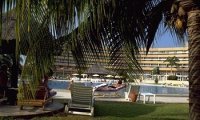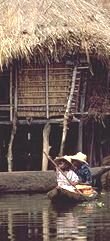
What's the point of going to Benin when no-one knows where it is
when you tell them where you were?
Benin has been something of a closely kept secret since a group of
young army officers, led by Major Kerekou, put a halt to twelve years of repeated coups by
taking control of the country themselves, in 1972.
Even now, after the relaxing of the Major's Marxist-Leninist line that
turned colonial Dahomey into the People's Republic of Benin, and earned it a somewhat
naive title of The Cuba of West Africa, the Gulf of Guinea's least known nation is still
not on most travellers' list of destinations.
International representation may be lodged in the characterless
coastal town of Cotonou,
but it is not the country's capital. Principal status is reserved for a town with a more
pleasant setting, and a proper place in history; Porto Novo.
All routes lead to Cotonou though, and once official business is seen
to, then diversions and ways out of the sandy grid are sought.
For many Europeans on the Trans-Sahara Peugeot run, the road ends in
Niger; although flights to Europe are generally cheaper from the northern Nigerian town of
Kano.
Those who do travel along the coast, between Abidjan and Lagos, look
at Cotonou as nothing more than a stop between Ghana's beaches and the flight home.

Benin Marina Hotel © Travel Notes
In fact, there isn't really that much to do in Cotonou except get out,
unless you like the idea of paying to join the French around the pool of the Benin Marina
Hotel (formerly Sheraton).
The most accessible attraction from Cotonou is the lake dwellings
at Ganvie.

|
Share-taxis to the landing stage at Abomey-Calavi leave
from the Dan Topka market at the end of Boulevard Saint Michel, in Cotonou. And then the
rip-off begins....
You'll need to pay tourist prices to get on the lake. |

Called an African Venice, because fifteen thousand people live in the
dwellings perched on piles in the lake, Ganvie is a lot more to the Tofinu peoples.
To the Tofinu peoples, Ganvie means:
'The collectivity of those who found peace at last'.
In the sixteenth century, the ruling Dan-Homey King combed the
countryside for men to be traded off in exchange for the goods that the Europeans brought
with them; especially guns.

| Initially, the weaker communities
seeking refuge from the king's army were safe on the lake, as the Abomey religion
prohibited warriors from attacking over water. |
Then, at the end of the 17th century, other feuds
occurred and there was a migration from over-farmed Tado to the swampy forest around Lake
Nokoue.
The Tofinu people work their lake efficiently; planting branches in
the shallow waters to produce artificial thickets, that trap the fish for extraction or
breeding.
Women, accompanied by their young daughters, also preserve the daily
commerce of the riverside markets.
As Benin opens up, even the police are friendly, and everyone has time
for a smile.
Closed doors seem a thing of the past but, unfortunately, 'cadeaux'
has become a word of the present.
Journey to
Benin - Landing in Lagos
By Michel.
Regional Directory - Search
The Web.
|